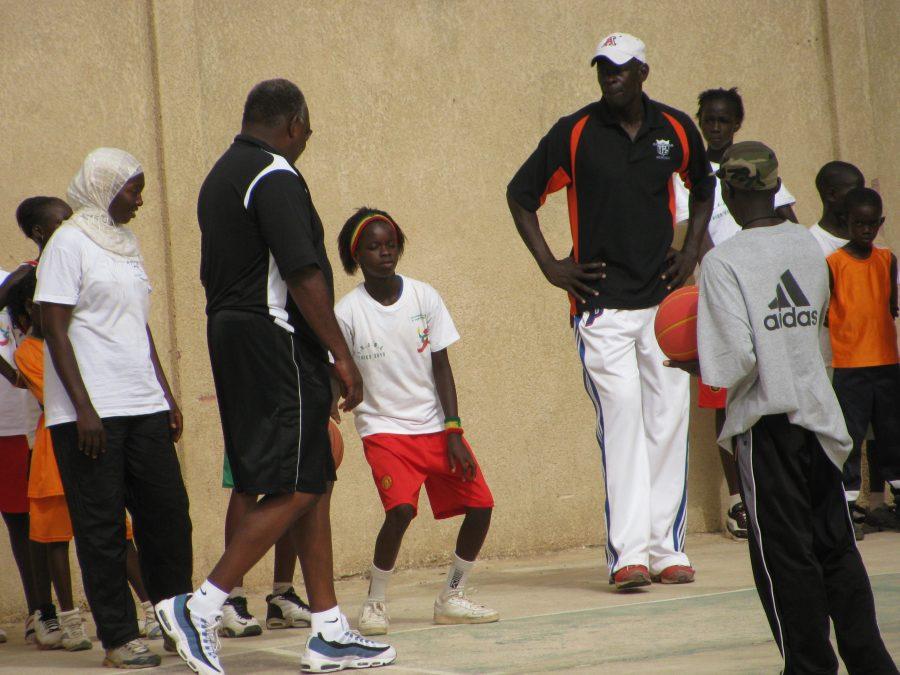Many students at UMass Boston are familiar with Men’s Basketball Coach Charlie Titus. He is our current athletic director, now entering his 37th season as head coach of the Men’s Basketball team. What you may not know is that Coach Titus is an overseas coach as well, spending part of his summers running his organization, Beyond Boards, shaping young African boys and girls into educated basketball players.
A cause that originally revolved around basketball eventually developed into something bigger than the game. Titus took the basketball program and transformed it into a learning experience.
He said, “[Beyond Boards] is a multi-faceted program. It is not just basketball. Basketball is a hook to get the kids involved.” The children are taught English, leadership and etiquette, and also work with environmental programs.
Titus’s work in Africa initially began in 1997 when the manager of the Beacons Basketball team, who was originally from Niger, asked the respected coach to help him organize a basketball camp for the upcoming summer. Titus came through, by contacting organizations, such as Coca-Cola Africa, to help sponsor the program.
Although Titus was willing to get the camp going, he had not intended to run the program in Africa. But the basketball manager insisted that he come along and visit Africa for the first time.
Titus agreed to host a boy’s camp for one week and a girl’s camp the following week. The government told him that girls could not participate, and that he would have to do two weeks for boys. When Titus threatened to pull out unless girls were allowed to take part, the government relented, and girls were permitted to spend a week at the camp.
On the first day, about a hundred kids arrived to participate in the camps. Although some lacked shoes or necessary basketball gear, they worked hard for the coach from UMass Boston.
On the second day, Titus described an unimaginable scene. He said, “We pulled up and the hill was loaded with kids. There were a thousand kids. We only expected a hundred.” The youths engulfed the hill that led to the University of Niger, where the camps were being held. They showed up in droves because they had received word that a black American college coach had arrived to teach the game.
Although Titus and his colleagues ran a successful program in Niger, it was short-term because of a military conflict, and he did not return. However, their relationship with Africa persisted. This past summer, Titus and UMass Boston Africana Studies professor Jemadari Kamara visited five African countries in 15 days, and assisted in 10 basketball camps. Among the country’s they visited were Senegal and Benin, where Titus said he can trace his family’s heritage to.
Titus has trained more than 400 basketball coaches, instructed numerous basketball clinics himself, and has worked with over 2000 youths. Some of his protégés are now members of the National Basketball teams of Senegal and Niger, and soon some will be playing in the NBA in the United States.
The program is not limited to Titus and Kamara. Four years ago, they traveled to Africa with Roger Perry from Men’s Basketball and a player from Women’s Basketball, who assisted in teaching computer proficiency for three weeks.
“All of this, to me, doesn’t work…if students aren’t involved,” said Titus.
Titus’s involvement with Africa permitted him to engage with the continent of his origins. He said, “[This experience has] allowed me to be in touch with my heritage, to touch my roots.” This experience has helped shape the person he is today, and it’s had a positive impact on his life.
He said, “It’s given me a greater appreciation of who I am. It has, believe it or not, given me a greater appreciation for this country. The one thing about being in a third world country is, you’re happy to get back home.” He added, “I look forward to [the trip every summer]. I think that I have an impact on the people that I have an opportunity to interact with. It makes a big impact on me, I feel good about it, and I like to go.”





















































